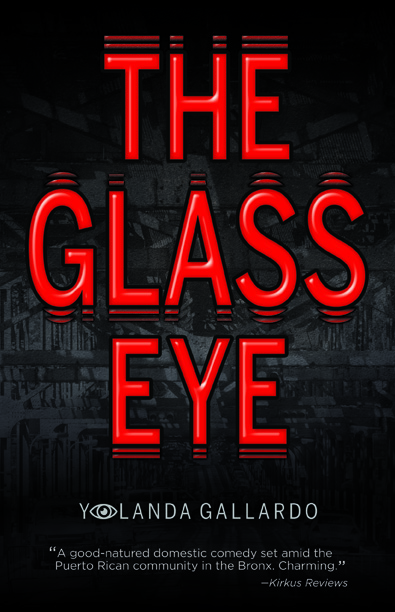Reading in Plague-time:
Tragedy tomorrow, black humor tonight
Review: Yolanda Gallardo. The Glass Eye. Houston: Arte Publico Press, 2019. ISBN: 978-1-55885-878-7
Michael Sedano
Now that you’ve read Chaucer and Bocaccio, dipped into Saramago, Camus, and maybe Andromeda Strain, and despite plague-inspired escapism, you still can’t escape feeling whelmed with the dystopia smeared across the front page, it’s time for something completely different. Enter laughing. Darkly.
Yolanda Gallardo’s The Glass Eye comes with a twisty uniqueness for reading in plague-time. The subject-matter mixes deadly serious themes with outrageous behaviors amid an authorial tour-de-force of dark optimism.
The opening two paragraphs have a reader rolling on the floor at the absurdity of events laid out with the wry expressiveness of high satire. A one-eyed woman named Doña Amada, an unnamed husband, a dismembered Sancha on the side named Sarah roaming the earth. Paragraph two is all about la Sarah.
“Sarah sightings have been reported as far away as New Orleans during Mardi Gras, where an old neighbor saw her throwing beads to the revelers from a balcony. Others saw the ghost of Sarah at George Washington’s headquarters in White Plains, occupying his chair while trying on his very tall boots; at the Westchester kennel dog show she caused many doggie accidents; at Saint Peter and Paul’s church where her likeness has been seen in photographs, posing angelically next to the statue of the Madonna. The sighting most gossiped about is the one at Yonkers Raceway, where she was seen running down the stretch in competition with the horses for first place.”
Colorful characters populate the neighborhood and get mixed up with the familia. There are lots of relationships to track. Antonia and Pepiton, they run a bodega and own the upstairs duplex. The sexy son wins the neighborhood bruja’s daughter, evicting the upstairs gente. The witch Doña Esperanza, and her daughter, Amada occupy a second axis of action. Carlotta, Gloria, Che, toothless Coco who marries Sarah and they have a son.
There’s trouble ahead in domestic hilarity that’s not funny at all, no matter how the author can’t help herself putting it.
“As he scanned the room for anything of importance he may have missed, he could feel the string of tiny beads that Sarah had placed around his neck for good luck tighten, break and scatter all over the linoleum. Scooping up as many as he could gather into the bag, he tossed it out the window. He who had known so little joy in life, followed the bag out of the window, down into the dirty alleyway below, and he was ultimately released from his pain.”
Here's this poor guy, Coco, a figure of ridicule with a hot wife and loving son. In a flash he realizes his son resembles the sexy Alberto who’s married to Amada, and, tossing out mementoes of his faithless wife, tosses himself out the window, too.
Amada’s glass eye happens in a scissors accident with ominous overtones. Why the mother displays anxiety that an older sibling has scissors near the baby isn’t addressed, but that undercurrent leads to Amada tripping and gouging out her eye. Losing the eye grows her reputation for prescience, like leaving the glass marble to watch the kids at breakfast. Her husband’s that other kid’s father and this bruja’s daughter doesn’t see that. One might wonder if the author savages the character for her turning a blind eye.
It’s funny and grotesque. The literary tactic of dismantling characters puts Gallardo in league with Nathanael West and Katherine Dunn, though Amada’s amputation isn’t nearly as extreme as those found in A Cool Million or Geek Love. Another subtle move is introducing Doña Esperanza, la bruja, in chapter thirteen. Not only the magic number, but the sly reference to the bruja’s powers includes finding a missing child. A hundred pages later, a missing child wraps up the story of the dismembered Sarah.
The Glass Eye is fun but it’s not all games. Gallardo’s narrative of Sarah’s murder offers keen psychological insight into a broken woman while the author offhandedly drops in a crucial plot development about Sarah’s character and the illegitimate son. More than this, the author has a bit of fun suggesting a supernatural agent, fantasy realism, in Sarah’s murder. Wrapping up the theme of marriage, infidelity, abandoned children closes the book with a feeling of, if not relentless optimism, a flexible pragmatism that despite chaos, things work out.
That tidy bundle of an ending doesn’t come easily, and that’s one reason to escape from plague-time for an hour or two with The Glass Eye’s deceptively serious-as-hell story with its laugh-out-loud, laugh-but-this-is-dreadful, just laugh attitudes. Yolanda Gallardo’s crafted a Bronx tale that not only passes the time but leaves the reader impressed to find so much in what started out as situation comedy.


No comments:
Post a Comment